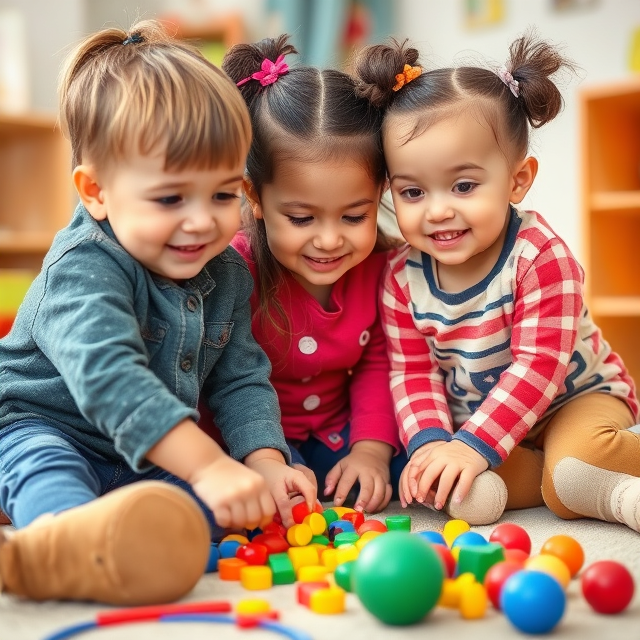Play Group classes are early childhood education programs designed for young children, typically between the ages of 2 to 4 years. These classes provide a structured yet fun learning environment where children can engage in play-based learning activities. Play Group classes focus on developing social, emotional, cognitive, and physical skills through play, which is essential for a child’s overall development.
In recent years, Play Group programs have become increasingly popular as parents seek quality early education experiences for their children. At this stage, the child’s brain is highly receptive, and a well-designed Play Group can lay a strong foundation for future learning.
Why Are Play Group Classes Important for Early Childhood Development?
Play Group classes offer a unique environment where children can learn and grow through play. Here are some key reasons why Play Group classes are so important:
- Socialization and Communication Skills
Play Group classes give children the opportunity to interact with their peers in a supervised setting. These interactions help children develop essential social skills such as sharing, taking turns, and expressing their feelings. - Cognitive Development
At this age, children are curious and eager to explore their surroundings. Play Group classes often include games, puzzles, and activities that stimulate cognitive growth. Children learn basic concepts such as colors, numbers, shapes, and letters while engaging in creative play. - Emotional Development
Play Group classes help children develop emotional resilience. As they navigate the experience of being away from home, they learn to manage separation anxiety and develop a sense of independence. Additionally, children are encouraged to express their emotions, which helps in emotional regulation. - Motor Skills Development
Through activities such as climbing, jumping, drawing, and playing with toys, Play Group classes promote the development of both fine and gross motor skills. These activities help children improve their coordination, balance, and hand-eye coordination. - Building Confidence
When children succeed in Play Group activities, whether it’s solving a puzzle or participating in a group activity, they gain confidence in their abilities. This self-esteem boost is crucial for their overall development and for tackling new challenges in later stages of learning.
Key Features of Play Group Classes
When choosing the right Play Group class for your child, it’s important to evaluate the program based on a variety of key features. These features ensure that the class is well-rounded, beneficial, and aligned with your child’s developmental needs. Here’s an expanded look at the key features to consider:
1. Experienced and Trained Educators
One of the most important factors in the quality of a Play Group class is the educators leading the program. Experienced teachers trained in early childhood education understand how young children develop and learn. They can create an environment where learning is both enjoyable and impactful. Here’s what you should expect from the educators:
- Child-Centric Approach: Trained educators know how to respond to the individual needs of each child, adjusting their teaching methods to cater to different learning styles and temperaments.
- Behavior Management Skills: Educators are equipped to manage classroom behavior in a positive way, promoting patience, respect, and understanding among the children.
- Knowledge of Child Development: Teachers should have an understanding of cognitive, emotional, social, and physical development at this stage, ensuring that each child is developing holistically.
2. Child-Centered Curriculum
A child-centered curriculum is one of the defining characteristics of a quality Play Group class. The focus is on allowing children to explore, learn, and grow through play, rather than following rigid academic structures. Here’s what to expect from a child-centered curriculum:
- Hands-On Learning: Activities like building blocks, puzzles, arts and crafts, and sensory play help children learn by doing, which is essential at this age.
- Thematic Learning: Many Play Group programs introduce themes such as animals, seasons, or family to help children understand the world around them in a fun and interactive way.
- Exploration-Based: The curriculum encourages curiosity and exploration, which allows children to discover new things at their own pace.
- Emphasis on Emotional and Social Skills: Along with cognitive development, the curriculum also focuses on building empathy, cooperation, and communication skills.
3. Safe and Stimulating Environment
The physical environment in which children learn is crucial for their development. A Play Group class should offer a safe, clean, and stimulating setting where children can freely explore and interact. The classroom should be:
- Childproof and Safe: All toys, furniture, and materials should be age-appropriate, non-toxic, and safe for children. Play areas should be well-maintained to prevent accidents.
- Vibrant and Engaging: Bright colors, interactive displays, and a variety of sensory materials should be present in the classroom to stimulate a child’s imagination and creativity.
- Variety of Learning Stations: A well-equipped Play Group should have designated areas for different activities, such as a reading nook, a pretend play area, and an art station. These areas encourage different types of play and learning.
- Outdoor Play Area: If possible, a safe outdoor space where children can run, jump, and explore nature is essential for physical and social development.
4. Small Class Sizes
The size of the class plays a significant role in the quality of the learning experience. Smaller class sizes allow for more personalized attention and a stronger teacher-student connection. Here’s why small class sizes matter:
- Individualized Attention: In a small class, teachers can closely monitor each child’s progress, offering tailored support where needed. Children who may need extra help with social skills, motor development, or other areas can receive the attention they require.
- Better Teacher-Student Interaction: Fewer students mean teachers can engage with each child more frequently, fostering a more intimate and nurturing environment.
- Effective Classroom Management: Smaller groups are easier to manage, reducing distractions and ensuring that children remain focused on the activities.
5. Parent Involvement
Active parental involvement is key to a child’s educational success, even in Play Group classes. A strong partnership between teachers and parents can enhance the child’s learning experience and emotional growth. Here are ways parent involvement might be encouraged:
- Regular Communication: Teachers should provide regular updates on the child’s progress through parent-teacher meetings, phone calls, or newsletters. This keeps parents informed and involved in their child’s educational journey.
- Parent-Teacher Conferences: Some Play Group classes offer scheduled conferences where parents can discuss their child’s strengths, areas of improvement, and any concerns with the teacher.
- Parent Participation in Activities: Some programs invite parents to participate in classroom activities or events, such as reading a story, helping with crafts, or assisting during field trips.
- Workshops for Parents: Many Play Group programs offer workshops or seminars on topics related to early childhood development, parenting techniques, and how parents can support their child’s learning at home.
6. Structured Yet Flexible Routine
While Play Group classes should be centered around play, having a flexible yet structured daily routine is essential for providing a sense of security and predictability for young children. A balanced routine can help children feel comfortable and thrive. Here’s what a well-structured day might include:
- Consistent Schedule: A regular schedule gives children a sense of stability, so they know what to expect each day. This might include time for free play, group activities, snack time, and outdoor play.
- Transition Time: Young children may struggle with transitions, so a good Play Group class will allow ample time for moving from one activity to another, helping children adjust gradually.
- Breaks and Rest: Structured rest time or a short nap is often included in the routine to ensure children stay refreshed and ready to learn.
7. Diverse Learning Resources and Materials
A quality Play Group class will be equipped with a wide range of learning resources and materials to stimulate the child’s curiosity and creativity. These might include:
- Books and Stories: Age-appropriate picture books, interactive books, and storytelling props encourage early literacy development and language skills.
- Toys and Games: Educational toys such as building blocks, puzzles, sorting games, and pretend play items help in developing problem-solving, fine motor skills, and social skills.
- Art and Craft Supplies: Materials for drawing, coloring, painting, and crafting allow children to express their creativity and improve fine motor skills.
- Technology (in moderation): In some programs, simple educational apps or interactive screens may be used to complement the learning experience, though this should always be balanced with hands-on activities.
8. Focus on Holistic Development
The aim of Play Group classes is to support a child’s development in all areas—cognitive, emotional, social, and physical. Quality programs should nurture the following:
- Cognitive Skills: By introducing concepts such as shapes, colors, numbers, and letters in a playful and fun way, children develop critical thinking and problem-solving skills.
- Physical Development: Activities that engage both fine motor (drawing, cutting, manipulating small objects) and gross motor skills (running, jumping, dancing) are integral to a well-rounded Play Group class.
- Social-Emotional Development: Through guided play, children learn empathy, cooperation, communication, and conflict resolution, all of which are crucial for future social interactions.
- Language and Communication: Interaction with teachers and peers, along with activities like storytelling and group discussions, helps develop language skills.
9. Focus on Inclusivity and Diversity
A high-quality Play Group class values inclusivity and celebrates diversity, ensuring all children feel welcome and respected. This might include:
- Cultural Sensitivity: The program should incorporate diverse materials, books, and activities that reflect different cultures, backgrounds, and family structures.
- Special Needs Support: Play Group classes should be inclusive of children with varying needs, providing accommodations and support to ensure that every child can participate fully.
- Respect for Individual Differences: Teachers should create an environment where children learn to appreciate diversity and understand the value of being kind and respectful to others.
What to Expect in Play Group Classes
Play Group classes vary from one program to another, but most will include a combination of the following activities:
- Free Play
Free play is a key component of Play Group classes. During this time, children are encouraged to explore the classroom, play with toys, and interact with their peers. This unstructured play helps children develop creativity and problem-solving skills. - Story Time
Storytelling is an important activity in Play Group classes. Teachers read stories to children, which helps with language development and imagination. This is also a time for children to engage in group discussions, ask questions, and express their thoughts. - Art and Craft Activities
Play Group classes often include simple art and craft activities that allow children to express themselves creatively. These activities also improve fine motor skills, such as coloring, cutting, and pasting. - Group Games
Group games teach children to cooperate, share, and take turns. Activities such as building blocks, pretend play, or simple group exercises help enhance teamwork and communication skills. - Nap Time and Snack Time
Play Group classes usually include scheduled nap times and snack breaks, giving children a chance to rest and recharge. These breaks are important for maintaining energy levels throughout the day.
How to Choose the Right Play Group Class
When selecting a Play Group class for your child, it’s important to consider a few key factors:
- Location and Accessibility
Choose a Play Group class that is conveniently located near your home or workplace. Accessibility plays a major role in your ability to maintain a consistent schedule. - Program Duration
Play Group classes can vary in duration, with some running for a few hours a day while others are longer. Consider your child’s attention span and your family’s schedule when choosing the right program. - Reviews and Recommendations
Research online and ask for recommendations from other parents. Reviews and testimonials can provide valuable insights into the quality of the Play Group classes. - Trial Sessions
Many programs offer trial sessions or observation days. Take advantage of these to see how your child reacts to the environment and the teachers.
Benefits of Play Group Classes at TNHSC
At TNHSC (https://tnhsc.com/school-college), we understand the importance of early childhood education, which is why we offer top-notch Play Group classes designed to give your child the best start in life. Here are some benefits of choosing our Play Group program:
- Expert Faculty: Our experienced educators are trained in early childhood development and use proven methods to encourage learning through play.
- Holistic Development: We focus on the social, emotional, cognitive, and physical development of every child.
- Safe and Supportive Environment: Your child will be in a safe and nurturing environment, where they can explore and learn confidently.
- Interactive Curriculum: Our Play Group curriculum is designed to be engaging, interactive, and fun, providing opportunities for children to learn through various activities.
Conclusion
Play Group classes are more than just a place for children to pass time—they are essential for laying a solid foundation for lifelong learning. By choosing the right Play Group program, you are giving your child the opportunity to develop critical skills that will serve them well in their academic and social lives.
At TNHSC, we are committed to providing your child with the best early education experiences. If you’re interested in enrolling your child in our Play Group classes, feel free to contact us for more information and to discuss personalized plans tailored to your child’s needs.












